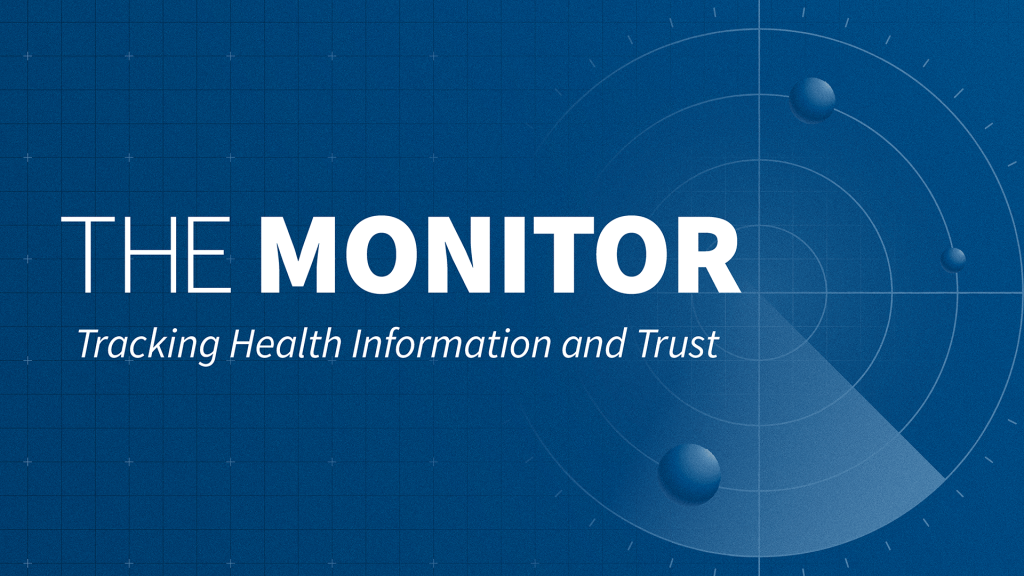VOLUME 31
New KFF-Washington Post Poll Explores Parents’ Vaccine Attitudes, and Confusion Follows ACIP Meeting on Vaccine Recommendations
Summary
This volume highlights findings from the KFF-Washington Post Survey of Parents, which explores parents’ views on childhood vaccines and their choices when it comes to vaccinating their own children. It also examines how questions from the Advisory Committee on Immunization Practices (ACIP) about the safety and necessity of some vaccines, including for COVID-19 and hepatitis B, may be impacting trust and public confusion. Additionally, it discusses recent HHS warnings about alleged links between Tylenol use during pregnancy and autism, and the rise in AI-generated deepfake videos impersonating doctors to sell unproven health products.
Featured: New KFF-Washington Post Survey Finds Many Parents Express Doubt and Confusion Over Childhood Vaccine Recommendations
The new KFF-Washington Post Survey of Parents takes a deep dive into parents’ views and decisions related to childhood vaccines. The survey finds that while a large majority of parents report following current vaccine guidance and are confident in the safety of MMR and polio vaccines, some, including larger shares of Republican parents and younger parents, express doubts about the current childhood vaccine schedule. One-third (35%) of parents say that vaccines don’t go through enough safety testing before being recommended for children, and one in four (26%) say the CDC recommends too many childhood vaccines. Republican and independent parents are more likely to express these views compared to Democratic parents. There are further divisions among Republican parents, with those who support the Make America Great Again (MAGA) movement more likely than non-MAGA Republican parents to say that childhood vaccines don’t go through enough safety testing (57% v. 32%) and that the CDC recommends too many childhood vaccines (49% v. 28%). Parents under age 35 are also more likely than parents ages 50 and over to say vaccines do not get enough safety testing (39% vs. 26%) and that the CDC recommends too many vaccines (29% vs. 23%).
When it comes to confidence in the safety of specific vaccines, majorities of parents across partisanship express confidence in the safety of polio (85%) and MMR (84%) vaccines for children, while the flu and COVID-19 vaccines are much more divisive. Two-thirds (65%) of parents say they are confident that flu vaccines are safe for children, while fewer than half (43%) express confidence in the safety of the COVID-19 vaccine for children. Partisans are sharply divided on the COVID-19 vaccine’s safety, with Democratic parents more than three times as likely as Republican parents to say they are confident COVID-19 vaccines are safe for children (70% v. 22%).
The KFF-Post survey finds that large shares of parents express uncertainty about false or misleading claims about vaccines and measles – many of which have been amplified by HHS Secretary Robert F. Kennedy Jr. Overall, few parents say they think it is true that chronic diseases are rising because of an increase in the number of vaccines children get (13%), that MMR vaccines can cause autism in children (9%), that the measles vaccine causes the same illness it is supposed to prevent (8%), or that vitamin A is an effective treatment for measles (6%). For each of these false or misleading claims, however, at least four in ten parents say they don’t know enough to say whether they are true or false, suggesting many parents may be confused about some of the science behind childhood vaccines.
When it comes to parents’ choice to vaccinate their children, a large majority (83%) report keeping their children up to date on childhood vaccines, however, about one in six (16%) say they have skipped or delayed at least one vaccine for any of their children (excluding vaccines for the flu or COVID-19). Parents’ reasons for skipping or delaying vaccines for their own children mirror many of the general concerns and uncertainty expressed by parents overall. About two-thirds (67%) of parents who skipped or delayed vaccines for their child say concerns about side effects were a “major reason” for their decision, while half cited not thinking vaccines are safe (53%) or necessary (51%) as major reasons they skipped or delayed their child’s vaccines.
Recent Developments
Health Committee Delays Vote on Changing Hepatitis B Vaccine Recommendation
Last week, the CDC’s Advisory Committee on Immunization Practices (ACIP) considered changing its recommendation that all newborns receive a hepatitis B vaccine at birth to waiting until newborns are at least one month old, but postponed the vote to allow more time to discuss safety and timing. The discussion and delayed vote came after HHS Secretary Robert F. Kennedy Jr. and members of the ACIP questioned the agency’s recommendation that all newborns be vaccinated against hepatitis B, saying that the virus is primarily spread through sexual activity and drug use in adults. However, hepatitis B can also be transmitted from mother to child during birth and potentially cause chronic infection and death. While most adults recover completely from hepatitis B infection, newborns infected at birth have a 90% chance of developing a chronic form of the disease, and 15-25% of people with chronic infection die from cirrhosis or liver cancer.
Although ACIP ultimately postponed the vote, the debates about timing and necessity that led up to last week’s meeting could contribute to public confusion. Administering the vaccine and immune globulin to newborns is 94% effective at preventing transmission of the disease, but the narrative that hepatitis B vaccines are unnecessary for babies spread on social media throughout September. Senator Rand Paul, who has more than 6 million followers on X, posted that universal newborn vaccination is unnecessary because mothers are routinely tested for hepatitis B infection and that the recommendation represented pharmaceutical industry influence. Senator Bill Cassidy, a physician who chairs the Senate’s health committee, shared one of Paul’s posts on X and disputed its claims, correctly saying that not all mothers receive prenatal care or testing. Paul’s posts were among the most-engaged-with posts about hepatitis B vaccines identified in KFF’s monitoring of social media in September thus far, and were reposted by influential accounts with large followings that regularly post about health, including one with nearly two million followers. Reactions to the posts reflected confusion about why the hepatitis B vaccine is given within the first hours of life, while most other vaccines are scheduled for later months. Kennedy has also alleged that the CDC concealed findings from a study that he claimed showed the hepatitis B vaccine increased the risk of autism, but he did not provide evidence to support these claims and research has shown there is no such association.
The timing of the hepatitis B vaccine has become a focal point for public debate, and these discussions may influence trust in health officials. Some parents who would otherwise vaccinate their children may feel uneasy about giving the vaccine in the first hours of life, particularly if the mother tests negative and there appear to be few immediate risk factors. Framing the decision as a personal choice rather than a scientific recommendation can create opportunities for confusion and vaccine hesitancy. At the same time, the vaccine’s history underscores the rationale for early administration, with universal newborn vaccination helping to reduce cases of perinatal transmission from thousands to only seven in 2023.
The KFF/Washington Post Survey of Parents found that about one in ten (9%) parents report skipping or delaying the hepatitis B vaccine for at least one of their children, including 5% who report skipping the vaccine and 4% who report delaying it. These are similar to the shares that report skipping or delaying other recommended childhood vaccines like MMR or chickenpox.
ACIP Changes COVID-19 Vaccine Guidance After Safety Debate
Federal health authorities presented misleading data about the safety of COVID-19 vaccines during last week’s meeting of ACIP, potentially undermining public confidence in vaccine guidance. The committee voted to eliminate universal COVID-19 recommendations, instead recommending that people consult healthcare providers before getting vaccinated. It also requested that the CDC consider adding language about what it said were risks or uncertainties related to COVID-19 vaccines to the Vaccine Information Sheet, a document that explains vaccine risks and benefits to recipients.
The votes came after presentations to the committee that included a number of false or misleading claims about COVID-19 vaccines. One presentation included a reference to a recent study that purported to show the vaccines were “contaminated” with DNA at rates beyond what is allowed by federal regulators, but that study is now under investigation by the publisher. Another study referenced at the meeting, which claimed that COVID-19 vaccines caused autism-like behaviors in rats, was retracted after it was found to contain inconsistencies in methods and data.
The use of unsubstantiated claims in a high-profile ACIP meeting to question vaccine safety has the potential to undermine public trust in COVID-19 vaccines. Despite the links made at the ACIP meeting, COVID-19 vaccines have been extensively studied and the dangers of COVID-19 itself outweigh the risks of the vaccine for most. False claims about the vaccines’ safety spread on social media following the committee meeting, with one account with more than 100,000 followers sharing news about the new guidance and claiming that COVID-19 vaccines were dangerous. The claims reflect broader concerns about COVID-19 vaccine safety. The KFF-Washington Post Survey of Parents found that about four in ten (43%) parents are confident in the safety of COVID-19 vaccines for children, including one in five who are “very confident.”
The debates within ACIP reflect a larger struggle over who is seen as credible in setting vaccine policy. Monitoring these reactions is part of understanding how public trust in the CDC and federal health officials shifts as disputes over childhood vaccines become more visible. The day before ACIP’s meeting, former CDC director Susan Monarez testified before the Senate on September 17 that she was dismissed for refusing Kennedy’s request to pre-approve vaccine recommendations by ACIP and to remove career scientists from their positions. Kennedy previously disputed Monarez’s accounts of their conversations, testifying before an earlier Senate committee that she was fired after telling him she was not trustworthy, though Monarez refuted this claim. KFF will continue to track reactions to these developments to provide insight into how public perception of vaccine safety and federal guidance evolves over time.
HHS Links Autism to Tylenol Use During Pregnancy Without Conclusive Evidence
On September 22, the Trump administration announced that FDA will now begin warning against Tylenol (acetaminophen) use during pregnancy, except in cases of high fever, citing a possible link to autism despite inconclusive evidence and opposition from major medical groups. The press release acknowledged the lack of established causation linking acetaminophen to neurodevelopmental disorders, but it advises providers to use their best judgment when prescribing acetaminophen during pregnancy.
Large, well-designed studies have found no increased risk and scientific consensus pointing to a strong genetic basis for autism. Although some smaller observational studies reported associations, they may have relied on self-reporting of acetaminophen use and failed to adequately control for other risk factors. For example, one recent review of 46 studies was shared by news outlets to warn of a link between maternal acetaminophen use and neurodevelopmental disorders. However, the conclusion from the review authors was in line with the current standard of care and the authors cautioned that their findings did not prove a causal link and called for further research. Of the 46 studies, only eight investigated autism, and most either relied on self-reported acetaminophen use or failed to adequately control for genetic factors, family history, or other confounders.
The anticipation of HHS’s announcement contributed to a large increase in people discussing the alleged link between acetaminophen and autism on X. In August, before news of the anticipated HHS report was shared, KFF’s monitoring of social media found just under 4,000 posts, reposts, or comments mentioning terms related to both autism and acetaminophen prior to reporting about the upcoming HHS announcement. The narrative received a small bump in the number of posts about it on August 19, when Kennedy’s former organization posted about the connection on X. Over the next few days, several news stations ran segments claiming that taking acetaminophen while pregnant could increase a child’s risk of developing autism. In September, after reports indicated the HHS guidance was forthcoming, the number of posts, reposts, and comments mentioning these terms on X increased to almost 150,000, as of the morning of September 22. In fact, more than 90% of such posts in 2025 thus far occurred in the month of September. Many of the most-engaged-with posts challenged the supposed link, with some sharing personal anecdotes about their experiences raising children with autism.
Acetaminophen is one of the few recommended treatments for pain and fever during pregnancy, as ibuprofen and other nonsteroidal anti-inflammatory drugs (NSAIDs) are known to increase risk of miscarriage and birth defects. Major medical organizations, including the American College of Obstetricians and Gynecologists (ACOG) and the Society for Maternal-Fetal Medicine (SMFM), continue to state acetaminophen is safe in pregnancy but advise consultation with a doctor. Unsupported claims about its safety could discourage pregnant people from treating fevers and pain when medically necessary, putting them at increased risk of severe adverse outcomes. Misleading narratives linking common medications to autism may also contribute to stigma against people with autism and their families by reinforcing the idea that autism is a condition that could have been prevented, echoing historical patterns which have often sought to assign blame to mothers of children with autism.
AI & Emerging Technology
Deepfakes of Doctors Used to Sell Unproven Health Products
Artificial intelligence (AI) tools are being used to create convincing fake videos impersonating doctors to sell unproven health products, with technology now sophisticated enough to generate realistic impersonators from only a few images or videos. Reporting from The New York Times and CBS News has documented a rise in deepfake videos across social media platforms featuring fabricated medical professionals, some using the identities of real physicians to give health advice or sell products primarily related to beauty, wellness, and weight loss. One physician who is known for debunking false health claims online discovered deepfake videos using his likeness to promote products he had never endorsed, appearing across TikTok, Instagram, Facebook, and YouTube.
Many of the videos promoted products as supposed “miracle cures,” with one featuring a deepfake of a doctor promoting a non-FDA approved product that the video said was “96% more effective than Ozempic.” Some were viewed millions of times before being removed, and the doctors who were impersonated reported difficulty getting the content removed through standard reporting channels.
Celebrities and popular entertainment figures have been the subject of health-related deepfakes before, often promoting similar “miracle cure” or weight-loss products. Research has shown that most people struggle to identify deepfake videos, with one meta-analysis showing that on average, humans did not accurately detect deepfake videos at levels significantly above chance. Videos impersonating doctors may exploit trust in physicians, which KFF polling has shown remains high even as trust in federal health agencies declines. So why does this matter? People are generally poor at detecting deepfakes and could be persuaded to purchase harmful or ineffective products. Traditional health literacy advice, which emphasizes verifying credentials or institutional affiliations, is largely undercut by these new techniques. The spread of deepfake videos of healthcare providers may erode trust in legitimate healthcare communications and make it difficult for patients to recognize authentic medical guidance, potentially putting them at risk of following dangerous health advice or purchasing ineffective treatments.
Support for the Health Information and Trust initiative is provided by the Robert Wood Johnson Foundation (RWJF). The views expressed do not necessarily reflect the views of RWJF and KFF maintains full editorial control over all of its policy analysis, polling, and journalism activities. The data shared in the Monitor is sourced through media monitoring research conducted by KFF.








